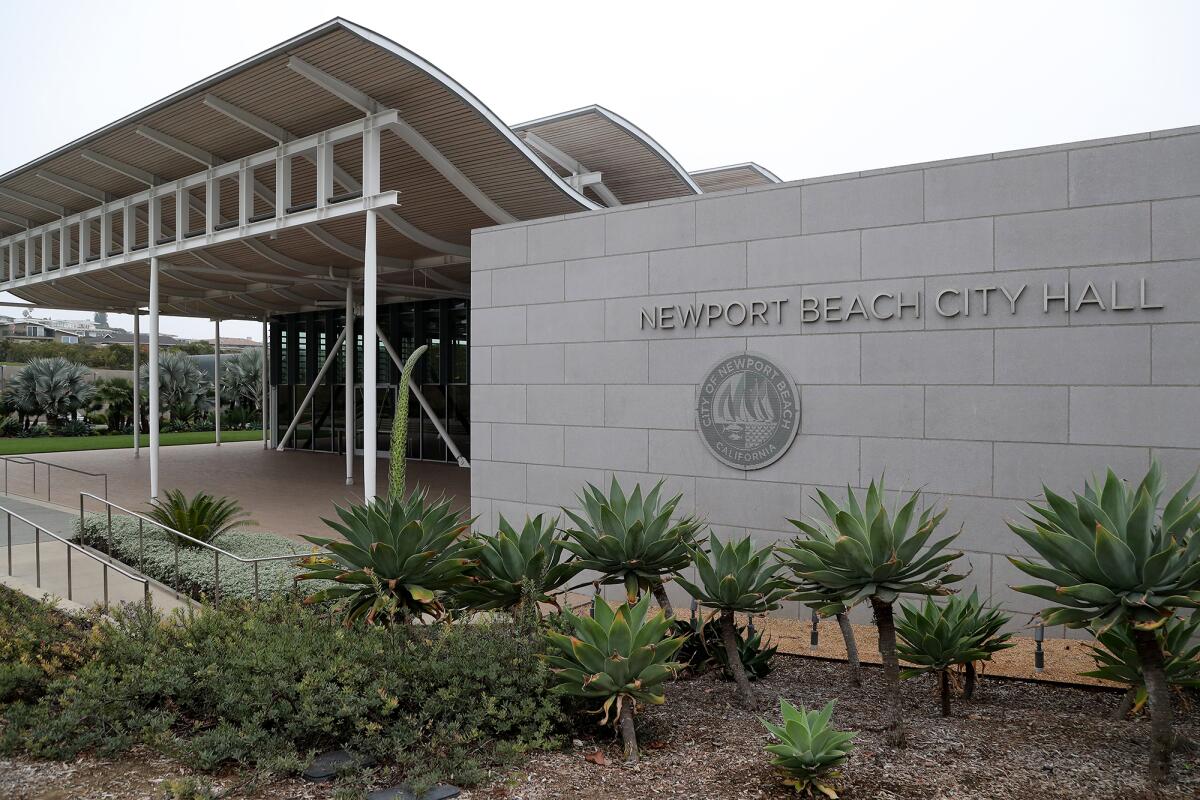Newport Beach City Council discusses fractional home ownership

- Share via
Newport Beach residential properties owned under fractional agreements — which tend to be used for vacation purposes — have raised concerns from neighbors who say the high turnover rates of those homes’ occupants lead to extra traffic, noise and parking issues.
The complaints have reached City Hall and, at the request of City Councilwoman Diane Dixon, two study sessions have now been held to assess how best to address the concerns. The first session was held in November, with a follow-up this week.
Fractional ownership of a property, as defined by city staff in a report, is “when multiple owners purchase a property and split the allowed time at the property through a formal arrangement. In the fractional model, the allocated time for each owner is based on their percentage of ownership.”
At the November meeting, community development director Seimone Jurjis noted that fractional ownership of real estate is not a new phenomenon and people have long participated in fractional ownership of larger buildings such as apartments or commercial properties.
Jurjis said city officials are able to regulate land use but not ownership of properties throughout the city.
As a follow-up to the November discussion the City Council directed staff to return with information on how neighboring jurisdictions were handling fractional home ownership, which they returned with Tuesday night.
A report prepared by Sagecrest Planning + Environmental, an urban planning agency in Anaheim, included survey data collected from 22 cities throughout the country and how they regulate fractional home ownership.
About 10 properties in Newport Beach are either confirmed or believed to be fractionally owned, according to the report. Jurjis noted one other property was identified after the report was created, bringing that total to 11. Those properties are generally located along the Balboa Peninsula, on Balboa Island and in Corona del Mar.
The survey revealed there isn’t a clear consensus on how to handle these kinds of properties. Sagecrest noted the city of Beverly Hills adopted a moratorium on fractional home ownership that will expire in July 2023.
Thirteen of the 22 cities surveyed consider fractional ownership as timeshare usage. Officials in the cities of Monterey and Carlsbad have existing regulations for those types of properties and enforce them. Seven of the cities who consider the properties to be timeshares do not regulate them and four say they will be revising their definition of a timeshare, according to the report.
Four other municipalities surveyed say they have issued cease and desist letters to people participating in fractional ownership. Three cities are working on updating their codes for timeshares, and one city, St. Helena, is in active litigation with property broker Pacaso, according to the report.
At least a dozen residents that spoke during the public comment portion of Tuesday’s study session were not supportive of fractional home ownership, asked for clearer definitions on timeshares and called on the City Council to regulate such ownerships. One speaker called on property brokers to encourage the purchase of properties in areas where vacation homes were more common, as opposed to residential neighborhoods.
“The quality of life in our city is being commended — even touted — by every candidate running for [City] Council. Every one of them have stated in forums or in written campaign materials that they value and vow to protect the quality of our residential communities,” said Nancy Scarborough. “Please, let’s get an upper hand on this.”
A representative of Pacaso also spoke during the study session, stating that fractional property owners view their vacation homes as “their second homes,” contribute to the local economy and see themselves as members of the community.
Councilman Will O’Neill said he didn’t think that any members of the City Council felt that fractional home ownership is good for communities. “The real question is how do you regulate them in a way that doesn’t have a spillover effect into others?” he asked.
Dixon thanked the residents that turned out to comment at Tuesday’s session and asked staff to come back with information on how to amend city code, whether or not a moratorium should be considered, and to find out what other cities are experiencing in relationship to the impacts fractional ownership has on state housing requirements.
All the latest on Orange County from Orange County.
Get our free TimesOC newsletter.
You may occasionally receive promotional content from the Daily Pilot.




